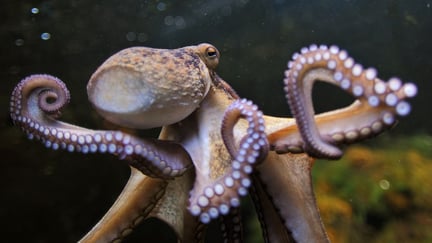
There are millions of species of fish, some we eat, some we keep as pets, some we experiment on, and some are free from human intervention.
Fish sentience is very misunderstood. We often dismiss fish as unfeeling and incapable of key sensations such as pain. This is partly because they are so physiologically different from us mammals, and lack the physiology that we attribute to consciousness and feeling. But it is also because they are so remote from us.
They live in seas, rivers, and lakes, we can’t touch them, and we can’t even see them unless we enter their watery world. It’s therefore hard for us to relate to fish and see the world through their eyes.
However, despite not having the brain structures thought to be responsible for pain, scientists have shown time and time again that fish can feel both physical and emotional hurt.
Many species possess specialised nerve receptors (nociceptors) that enable them to detect and respond to painful stimuli. When injured, they exhibit behaviours that suggest pain, such as rubbing against surfaces, becoming less active, and changing their feeding habits.
Fish are also highly intelligent animals. They can form strong social bonds, interact with their environment and other fish through various forms of communication, recognise individuals, and use tools to achieve specific goals.
Clearly, they have extensive cognitive abilities – but a fish’s intelligence doesn’t end there. Fish are also deeply emotional creatures, capable of having intense feelings.
Do fish have feelings?
Fish absolutely have feelings – and not just negative ones like stress. Fish can experience joy and pleasure. Importantly, they can form pair bonds and community structures, and conduct elaborate courtship rituals.
Do fishes feel pain?
Fish respond to painful experiences.
During an experiment where bee venom or vinegar was applied to the lips of trout, they responded by rubbing their lips on the side of the tank and lost their sense of neophobia (the fear of novel objects that is key to their survival). Then, when the trout were given painkillers, their behaviour reverted to normal, proving that they do experience pain.
Fish’s cognitive and emotional intelligence
It’s a common myth that goldfish have a three-second memory – but it simply isn’t true, and in fact, they’re pretty intelligent. They can think, remember information, and communicate with other fish.
It may not be the same as our experience of pain, but the important thing is that it matters to them to the extent that they alter their behaviour and hinder their natural survival instincts.
A goldfish's memory isn't so short after all
Researchers studying how goldfish learn to distinguish between events found that goldfish have a memory of at least three months, can distinguish between different colours, shapes and sounds, and can learn to press a lever at a certain time of the day to get food.
Fish form social bonds and work together
Fish have also shown extraordinary initiative in their natural environments. The video from Nature magazine shows two species of fish working together to hunt.
Cooperation like this between different species is unusual in the animal kingdom, and these two fish species show remarkable ingenuity and intelligence in their partnership.
Such emotionally intelligent animals shouldn’t be subjected to cruel aquafarming
Fish are traded, caught, farmed, and killed in their trillions every year and fish meat is only becoming more popular – meaning an increasing number of fish are condemned to lives of suffering.
Yet their well-being is often overlooked and their feelings too frequently ignored.
Fish are kept in disease- and parasite-riddled confinement
In aquaculture, salmon are squashed together in small, confined environments. These close quarters leave them unable to escape disease, parasites, and sea lice that spread easily from fish to fish, inflicting pain and suffering.
The cramped living conditions resemble cruel chicken meat factory farming on land, except the suffering of the fish often goes unnoticed, hidden beneath the water.
Fish are depressed
Unnatural aquaculture environments also stunt salmon growth. These underdeveloped fish are typically smaller, frequently suffer from anorexia, and aren’t as active as they should be.
When studying their brain activity and cortisol levels, researchers discovered that these fish were experiencing depression.
Fish have feelings - help us end their suffering
Currently, there is little legal protection for fish around the world. Join our mission and change the way aquaculture and factory farming work. Together, we can stop animal cruelty and fish suffering today.
Fish feeling FAQs
Can fish feel?
Fish can feel – and there’s over 30 years of scientific research to prove it. Between 1990 and 2020, 349 articles documenting sentience in fish were published.
Researchers recognised that over 140 species of fish can experience a wide variety of emotions, ranging from altruism to stress.
Do fish feel fear?
Fish can feel fear. Researchers have recorded fish exhibiting behavioural responses to stressful stimuli on 46 occasions.
Can fish feel happy?
Research on fish sentience has so far focused primarily on negative emotions, such as pain, stress, and fear.
However, it’s important to recognise that fish can also experience positive emotions like joy and pleasure.
Does a fish feel pain when hooked?
Fish are capable of feeling pain. Studies have proven that common carp, goldfish, and rainbow trout all experience pain.
This is because they have nerve receptors, known as nociceptors, that allow them to detect and respond to painful stimuli. As they’re found in a fish’s mouth, lip, and jaw (among other body parts), a fish is likely to feel pain when hooked.
Do fish recognise you?
According to research into fish cognition, fish can recognise themselves, their kin, and other fish using both chemical and visual cues. Guppies, for example, can recognise another fish after about two weeks and will choose to shoal with them over an unfamiliar fish.
As they can also recognise individuals, both within their own species and across different species, it is possible that fish can recognise humans they interact with frequently.
Do fish know they are in a tank?
Fish experience stress when they’re in a small or poorly maintained tank if the water quality is low.
Researchers discovered that small containers severely restrict their natural behaviour and poor water quality affects their ability to cope with social isolation and human presence.
Further reading
Braithwaite, V., Droege, P., 2016. Why human pain can’t tell us whether fish feel pain. J. Anim.
Bshary, R., Brown, C., 2014. Fish cognition. Current Biology, Volume 24, Issue 19.
Chandroo, K., Yue, S., Moccia, R., 2004. An evaluation of current perspectives on consciousness and pain in fishes. Fish Fish.
Compassion in World Farming, One Kind., 2021. Underwater Cages, Parasites & Dead Fish: Why a Moratorium on Scottish Salmon Farming Expansion is Imperative.
Dinets, V., 2016. No cortex, no cry. Anim. Sentience An Interdiscip.
FAO, 2020. The State of World Fisheries and Aquaculture 2020. Sustainability in action. Rome.
Gee, P., Stephenson, D., Wright, D., 2003. Temporal discrimination learning of operant feeding in goldfish (Carassius auratus). J. Exp. Anal. Behav. 62, 1–13.
Lambert H, Cornish A, Elwin A, D'Cruze N., 2022. A Kettle of Fish: A Review of the Scientific Literature for Evidence of Fish Sentience. Animals (Basel).
Proctor, H.S., 2012. Animal Sentience: Where Are We and Where Are We Heading? Animals 2, 628–639.
Sneddon, L., 2003. The evidence for pain in fish: the use of morphine as an analgesic. Appl. Anim. Behav. Sci. 83, 153–162.
Sneddon, L, 2009. Pain Perception in Fish: Indicators and Endpoints. ILAR Journal, Volume 50, Issue 4.
Vindas, M. A., Johansen, I. B., Folkedal, O., Höglund, E., Gorissen, M., Flik, G., . . . Øverli, Ø., 2016. Brain serotonergic activation in growth-stunted farmed salmon: adaption versus pathology. Royal Society Open Science.
Yue-Cottee, S., Cottee, S.Y., 2012. Are fish the victims of “speciesism”? A discussion about fear, pain and animal consciousness. Fish Physiol. Biochem. 38, 5–15.
Related content
Animal feelings and the hard facts that we don't admit
Blog
Breakthrough research and studies of animals' emotions and feelings has developed our understanding of how wild animals can suffer in captivity.
Do pigs feel emotions?
Blog
Often underestimated, pigs are incredible animals that possess a rich and complex range of feelings.
Can elephants feel emotions and empathy?
Blog
Learn about the surprising emotional lives of elephants and how understanding their feelings is crucial.






